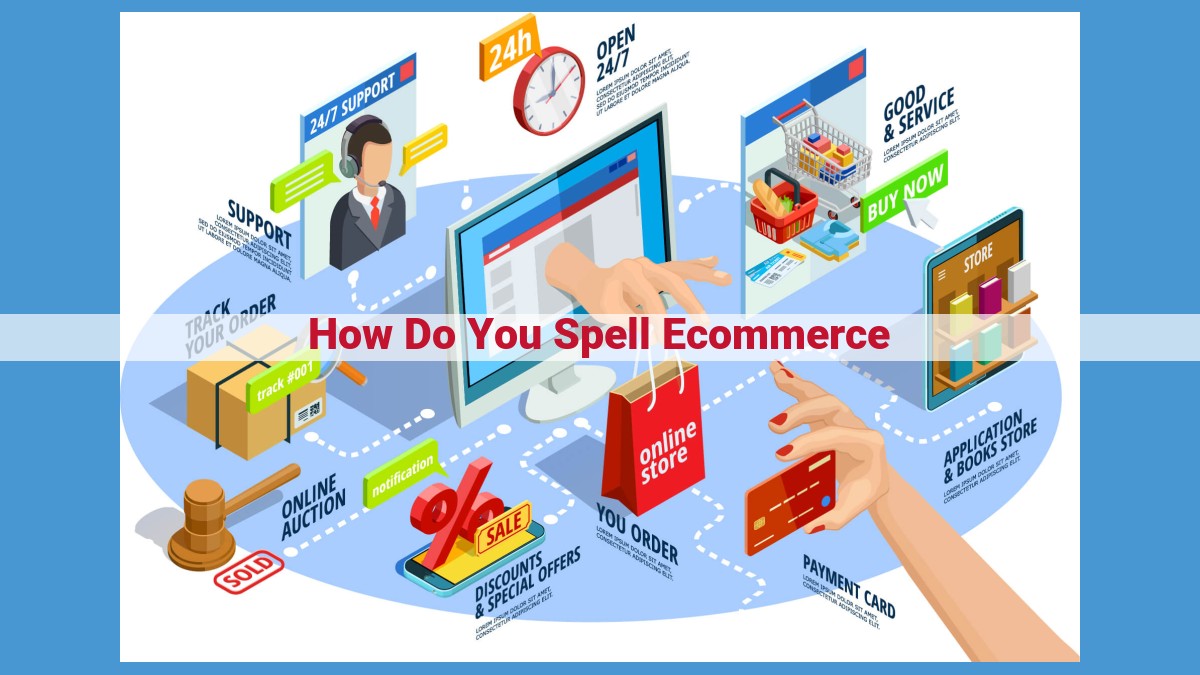How to Spell Ecommerce
Ecommerce, also known as electronic commerce, involves the buying and selling of goods and services online through virtual marketplaces, digital products, and online transactions. While the term is often spelled as “eCommerce” or “Electronic Commerce,” the correct spelling is “eCommerce,” which signifies the integration of technology into commercial transactions. Common misspellings include “eccomerce,” “ecomerce,” “ecommerse,” and “e-commerse,” which may cause confusion and compromise professionalism.
Understanding eCommerce: The Backbone of Online Business
Dive into the world of eCommerce, the electronic marketplace that’s transforming how we buy and sell today. This multifaceted concept has many nuances, including a variety of spellings that can leave you scratching your head. Let’s explore the intricacies of eCommerce, unraveling its definition and the common misspellings that may trip you up.
Defining eCommerce: A Digital Marketplace
eCommerce stands for electronic commerce, a term that encompasses the buying and selling of goods and services over the internet. It’s a virtual hub where businesses and consumers connect seamlessly, transcending geographical boundaries. From online shopping to virtual marketplaces and digital products, eCommerce has redefined the consumer experience.
**eCommerce: Embracing the Digital Marketplace**
In today’s interconnected world, eCommerce has emerged as an indispensable part of our lives. It encompasses the seamless buying and selling of goods and services online, transcending the boundaries of physical stores and geographical locations.
With eCommerce, consumers can effortlessly browse a vast array of products and services from the comfort of their homes. Online transactions have become commonplace, as secure payment gateways and advanced shipping options facilitate a smooth shopping experience. Virtual marketplaces, such as Amazon and Etsy, have become bustling hubs where countless businesses showcase their offerings.
Moreover, digital products have gained immense popularity in the eCommerce realm. From software and apps to ebooks and online courses, these intangible goods offer convenience and instant gratification to consumers. The digital nature of these products allows for easy distribution and reduced overhead costs.
As a result, eCommerce has revolutionized the way businesses operate. Small and medium-sized businesses can now reach a global audience, while established brands expand their reach and offer enhanced customer service through online platforms. The convenience and accessibility of eCommerce empower consumers, enabling them to make informed purchase decisions and access a wider range of options than ever before.
Electronic Commerce: Understanding the Alternative to eCommerce
Within the realm of digital commerce, various terms may arise to describe the process of buying and selling goods and services online. One such term, electronic commerce, often referred to as eCommerce, has emerged as the predominant nomenclature. However, it’s important to recognize that electronic commerce serves as an equally valid alternative, offering a nuanced perspective on this transformative business model.
Electronic commerce, or eCommerce, fundamentally encompasses the utilization of technology to facilitate transactions between businesses and consumers or businesses and other businesses. This may include the establishment of online marketplaces, where vendors display their products or services, and buyers browse and purchase using electronic payment methods. Furthermore, digital products, such as software or ebooks, have become an integral part of electronic commerce, eliminating the need for physical distribution.
The use of electronic commerce offers numerous advantages, including increased convenience, wider market reach for businesses, and access to a larger selection of goods and services for consumers. The technology employed in electronic commerce enables real-time transactions, efficient order processing, and seamless customer service.
In essence, electronic commerce, while synonymous with eCommerce, emphasizes the technological infrastructure that underpins this transformative business model. By embracing technology, electronic commerce empowers businesses to connect with customers globally and provides consumers with unparalleled access to products and services, revolutionizing the way we do business.
Common Misspellings of eCommerce
In the realm of online business, the term “eCommerce” stands tall as the industry standard. However, it’s not uncommon to encounter various misspellings of this term, which can lead to confusion and unprofessionalism. Let’s delve into the most common misspellings and shed light on the correct usage.
“Eccomerce” This misspelling is likely caused by the omission of the apostrophe in “e’commerce.” Remember, the term is derived from “electronic commerce,” which highlights the use of technology in facilitating online transactions.
“Ecomerce” Another common misspelling, “ecomerce,” misses the “m” in “commerce.” Commerce refers to the exchange of goods and services, and it’s an essential part of the “eCommerce” concept.
“Ecommerse” This misspelling swaps the “m” and “r” in “commerce.” It’s a minor error but can still create confusion and undermine the credibility of your online presence.
“E-commerse” While this misspelling includes the apostrophe, it adds an unnecessary hyphen between “e” and “commerce.” The term “eCommerce” is already widely recognized and does not require a hyphen for clarity.
Embrace the Correct Spelling
Adopting the correct spelling of “eCommerce” is crucial for maintaining professionalism and clarity in your online communications. By using the accepted spelling, you demonstrate your attention to detail and respect for industry standards, which can positively impact your credibility and brand reputation. Remember, “eCommerce” correctly conveys the concept of buying and selling goods and services through electronic means.
